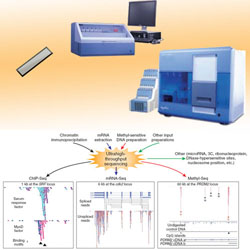Difference between revisions of "DNA Sequencing"
| (6 intermediate revisions by 2 users not shown) | |||
| Line 1: | Line 1: | ||
{{TopRightSideBar| | {{TopRightSideBar| | ||
| − | |title= | + | |title=Sequencing Service |
|image=Dna_seq.jpg | |image=Dna_seq.jpg | ||
| − | |subtitle= | + | |subtitle= |
|highlights= | |highlights= | ||
}} | }} | ||
| + | |||
| + | CAGT has two high-throughput Solexa Genome Analyzers 2.0 (Illumina), which are currently being used for a variety of applications, including ChIP-Seq, miRNA sequencing and expression sequencing. Each next-generation sequencer can process up to 16 samples per week, with a data yield of approximately 10 million reads per sample. Read lengths are 17, 26 or 36 bases. | ||
| + | |||
| + | This sequencing technology consists of binding randomly fragmented DNA to an optical flowcell . Templates are “sequenced” by incorporating fluorescently labeled nucleotides in a “Sequencing-By-Synthesis” reaction. A detailed description of this process can be found here: http://illumina.com/pages.ilmn?ID=203 | ||
| + | |||
| + | The system consists of a cluster generation station and a Genome Analyzer, both of which work in concert to generate and analyze flowcells. An overview of the Illumina Genome Analyzer system can be found at the Illumina website: http://illumina.com/pages.ilmn?ID=204 | ||
| + | |||
| + | Illumina currently provides reagents and support for a five major sequencing applications: | ||
| + | |||
| + | * Genome sequencing and resequencing <br> | ||
| + | * Paired-end sequencing <br> | ||
| + | * Digital gene expression <br> | ||
| + | * Small RNA discovery <br> | ||
| + | * ChIP-Seq <br> | ||
Latest revision as of 17:08, 18 August 2008
|
CAGT has two high-throughput Solexa Genome Analyzers 2.0 (Illumina), which are currently being used for a variety of applications, including ChIP-Seq, miRNA sequencing and expression sequencing. Each next-generation sequencer can process up to 16 samples per week, with a data yield of approximately 10 million reads per sample. Read lengths are 17, 26 or 36 bases.
This sequencing technology consists of binding randomly fragmented DNA to an optical flowcell . Templates are “sequenced” by incorporating fluorescently labeled nucleotides in a “Sequencing-By-Synthesis” reaction. A detailed description of this process can be found here: http://illumina.com/pages.ilmn?ID=203
The system consists of a cluster generation station and a Genome Analyzer, both of which work in concert to generate and analyze flowcells. An overview of the Illumina Genome Analyzer system can be found at the Illumina website: http://illumina.com/pages.ilmn?ID=204
Illumina currently provides reagents and support for a five major sequencing applications:
- Genome sequencing and resequencing
- Paired-end sequencing
- Digital gene expression
- Small RNA discovery
- ChIP-Seq
